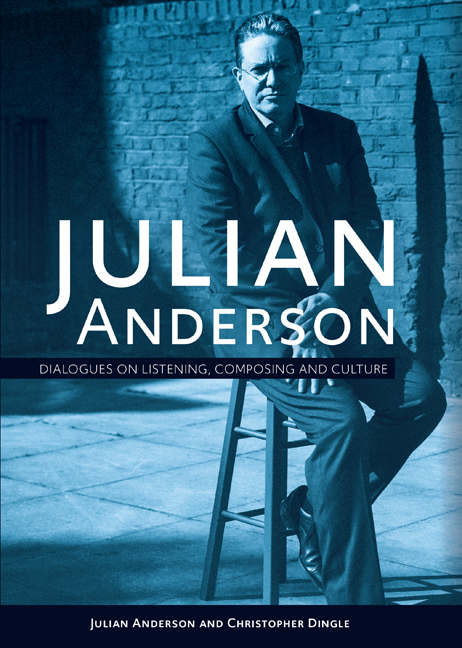Book contents
- Frontmatter
- Contents
- List of Illustrations
- Foreword
- Acknowledgements
- Introduction
- Prelude – Jeux: A Conversation Over Lunch
- Conversation One Origins
- Conversation Two Enthusiasms
- Conversation Three Training
- Conversation Four Dance
- Conversation Five Folk
- Conversation Six Composing (or Not)
- Conversation Seven Understandings
- Conversation Eight Beginnings (and Endings)
- Conversation Nine Puzzles
- Conversation Ten Singing
- Conversation Eleven Olly
- Conversation Twelve Memory
- Conversation Thirteen Opera
- Conversation Fourteen Practices
- Conversation Fifteen Outsiders?
- Conversation Sixteen Quartets
- Conversation Seventeen Advocacy
- Conversation Eighteen Partnerships
- Coda: Multiple Choices
- Chronology
- List of Personae
- Glossary of Musical Terms
- Macrotonality
- Catalogue of Published Works by Julian Anderson
- List of Recordings of Julian Anderson’s Music
- Bibliography
- Discography
- Index
Conversation Nine - Puzzles
Published online by Cambridge University Press: 16 September 2020
- Frontmatter
- Contents
- List of Illustrations
- Foreword
- Acknowledgements
- Introduction
- Prelude – Jeux: A Conversation Over Lunch
- Conversation One Origins
- Conversation Two Enthusiasms
- Conversation Three Training
- Conversation Four Dance
- Conversation Five Folk
- Conversation Six Composing (or Not)
- Conversation Seven Understandings
- Conversation Eight Beginnings (and Endings)
- Conversation Nine Puzzles
- Conversation Ten Singing
- Conversation Eleven Olly
- Conversation Twelve Memory
- Conversation Thirteen Opera
- Conversation Fourteen Practices
- Conversation Fifteen Outsiders?
- Conversation Sixteen Quartets
- Conversation Seventeen Advocacy
- Conversation Eighteen Partnerships
- Coda: Multiple Choices
- Chronology
- List of Personae
- Glossary of Musical Terms
- Macrotonality
- Catalogue of Published Works by Julian Anderson
- List of Recordings of Julian Anderson’s Music
- Bibliography
- Discography
- Index
Summary
The first pages of this conversation explore the differing ways in which Messiaen and Boulez communicated and mis-communicated how they composed. It then moves to an exchange about Messiaen's opera, Saint François d’Assise, exploring its poor initial reception, other notable productions, frustration at the lack of a full staging in Britain and the innovative nature of the use of aleatoricism in ‘The Sermon to the Birds’ scene. In the midst of this, the conversation also explores the use of the vernacular in Janáček, Schoenberg and Bach, and it finishes with some brief observations about how minimalism was viewed in its early years.
CD: You have been refreshingly honest in these conversations not just about how you have composed, but also the things that are not clear even to you. This strikes me as being an important corrective to the apparently incontrovertible statements made by various composers, including ones whose music we both love, such as Messiaen and Boulez.
JA: One of the things that makes Messiaen continually so fascinating is the unexplained gap between how he made the music and what the music is. We can all think of ways of combining his techniques. After all, he was very open about them from Technique onwards. Anyone has a recipe there that they could use to make pieces of music, quite easily. I once did a pastiche Messiaen piece of some size. At the Royal College of Music, for our second-year portfolio, we had to do a set of stylistic pastiches. It was a sort of stylistic/technical exercise. I asked permission to do one of my items in the style of Olivier Messiaen. They said, ‘Well, not later Messiaen’, meaning not Livre d’orgue or something, but they added, ‘You can, if it is the tonal/modal period of Messiaen.’ So I wrote three songs, which were as if Messiaen had composed a song cycle between Chants de terre et de ciel and Harawi – just after Quartet for the End of Time, roughly speaking. It was a very interesting experience because one can assemble his techniques, but to make a musically convincing piece is not easy.
- Type
- Chapter
- Information
- Julian AndersonDialogues on Listening, Composing and Culture, pp. 174 - 185Publisher: Boydell & BrewerPrint publication year: 2020



